According to Serenity at Summit, an addiction treatment center, recognizing the four most common triggers can help keep you on the road to recovery.
We’ve discussed recovery triggers on our blog in the past, but it’s always helpful to revisit the topic, as triggers are generally a major obstacle in any recovery reports Summit Behavioral Health, an addiction treatment center with locations in New Jersey and Massachusetts.
Although triggers can vary from person to person, there are four triggers that tend to rear their ugly heads for just about everyone from time to time. An easy way to remember these triggers is by using the acronym HALT, which stands for hunger, anger, loneliness, and tiredness.
Overcoming the HALT Triggers
One of the best things you can do for yourself as you begin your recovery is to be aware of which triggers affect you the most. When you have identified the things that tempt you to relapse, you can do a more effective job of avoiding them. It may sound simple, but it’s amazing how quickly life and responsibilities can take over, causing you to overlook possible triggers in your path.
- There is a reason the famous Snickers “you’re not you when you’re hungry” advertising campaign was so successful. Many people experience personality changes, including irritability, when they are hungry. All you have to do is take a glance at what happens to your body1 after just six hours without food to understand why hunger is such a common trigger. If you’re in a high-stress environment where you can’t break to grab a meal, pack some on-the-go food items, such as protein bars or string cheese.
- People don’t always act rationally when they’re angry. If you have ever hit “send” on an angry email, only to regret it a few hours later after you have calmed down, you know how anger can lead you to do and say things you shouldn’t. When your temper is ready to boil over, turn your focus toward something fun or relaxing. Indulge in a bubble bath or do something physically demanding like going for a hike or a jog.
- Fortunately, social media and technology have made it easier to connect with friends, even when you can’t meet up in person. If you’re feeling lonely and can’t find time to do lunch or take in a movie with a friend or loved one, jump on a phone call or ask someone you care about to talk online. If you feel comfortable, you can share that you’re struggling with loneliness and worried about relapsing. Sometimes, just talking about your concerns can help you work through them in a constructive way.
- According to studies, up to one-third of Americans2 don’t get enough sleep. Sleep-deprivation can lead to a host of problems, including drowsy driving and delayed reaction times that put you in danger. Chronic sleep-deprivation can also make it easier to indulge in over-the-counter medications and substances that are supposed to perk you up. If you’re in recovery, however, even something like caffeine pills or caffeinated drinks can open the door to a relapse.
Get Started on Your Personalized Recovery Plan
Serenity at Summit will design a personalized recovery plan just for you. Call our addiction treatment center today to explore your treatment options. Local treatment centers are available to help you where you live. Call (877) 697-9579.

